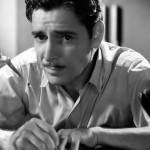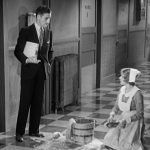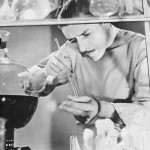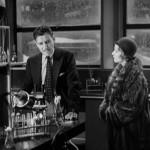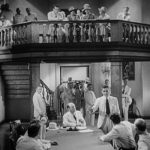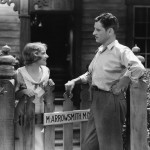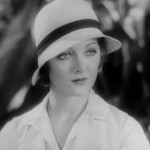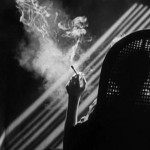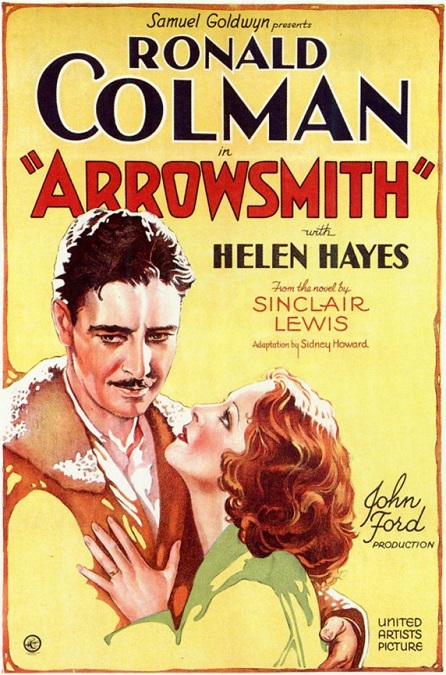
Arrowsmith – 1931 / 1932
What can I say? This was not my favorite Best Picture nominee, so far. On the surface, this story had the potential to be a good one. It has several elements that a good drama should have. It has a bit of romance, a bit of drama, and a tragic ending that is supposed to stick with you after the movie is over. But the way it was handled didn’t really work for me. Here’s why.
The director, John Ford, made a film that had a pace which seemed strangely rushed and frantic. It felt choppy and inconsistent. I had already made this determination on my own, but when I did my research, I discovered that there was a reason for my assessment. Studio Director Samuel Goldwyn had hired Ford as the director on the condition that he refrained from drinking any alcohol during production. As a result, Ford sped up the filming as much as he could.
And it shows. A typical scene would have a character walk onto the screen, say his lines quickly, and the scene would end. The next scene would begin and the dialogue would be delivered, and the scene would end. Cut. Print. Next scene! Great! Cut. Print. Next scene! The odd pacing made me think that more time should have been taken to give the audience a chance to settle into the plot.
Ronald Colman played the lead, Dr. Martin Arrowsmith. He is a brilliant scientist that has everything he needs to launch a great career as a medical researcher. He has dreams and aspirations of becoming a giant in the field. But right before his career is about to take off, he meets the love of his life, Leora, played by Helen Hayes. His career is sidetracked and he becomes a simple country doctor, destined to live in mediocrity.
But so in love with her is he that within minutes of meeting her, he asks her out to dinner. Cut. Print. Next scene! By the time the first date is over, he has proposed to her. Cut. Print. Next Scene! They are unceremoniously married by a justice of the peace. Cut…
Leora should have gotten to know Martin better before tying the knot. True, she did love him, but he was overly-compulsive about his work, making a habit of ignoring her when he was in work mode. As a result she became lonely, miserable, and obsessive about spending time with him. When he gets a job as a true medical research scientist and is sent to the West Indies to combat the bubonic plague, she desperately follows him. At the behest of his heartless corporate employers, Martin begins conducting medical experiments on human guinea pigs.
While there, he meets a New Yorker who is stranded on the island. She is Joyce Lanyon, played by Myrna Loy. They share an attraction, for each other, but he remains faithful to his wife. Of course, we can see what will happen. Martin finds his cure, but he is too late to save Leora who has contracted the disease.
I mention all this to illustrate the greatest example of how truncated the movie felt, which occurred in the last few minutes. Because of his success at curing the plague, a great public reception takes place for Arrowsmith’s homecoming. However, he decides to become an independent researcher, away from corporate money and his boss’s shady ethical practices and demands. From out of nowhere, Joyce Lanyon shows up. She walks on-camera, says she is sorry for his loss, and implies that she wants to see more of him. He asks if she wouldn’t mind not seeing him for a long time. She takes this to mean that he is no longer interested, turns around, and exits just as quickly as she entered. Just like that. Cut! Print! Next scene!
But somehow, despite the hurried pace, the movie had a running time of 1 hour and 38 minutes. I wonder how long it would have been if the pace had not been so frantic. I’m sure it could have been handled with more delicacy and subtlety than this. The pace just made the whole thing feel confusing and emotionless. Frankly, I don’t think this should have even been nominated for Best Picture. Though in its favor, it sometimes made interesting use of camera angles and lighting.
Cut! Print! Next Scene! That was the last one? Thank God! Somebody get me a drink!
